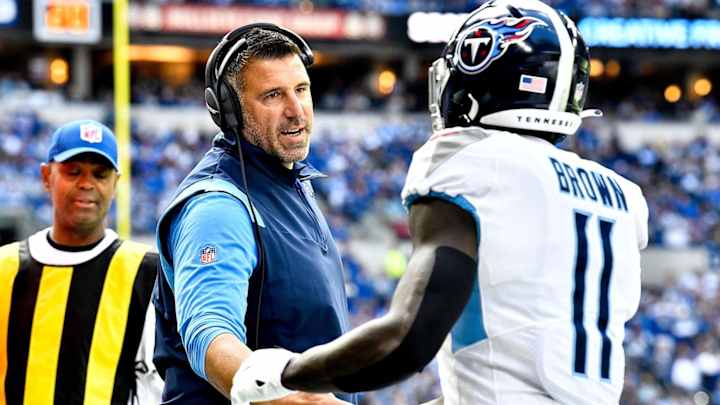Glennon: Titans Chose Eventual Payoff Over Payout

In this story:
NASHVILLE – It was an offseason of discontent for the talented young wide receivers of the 2019 draft class.
Empowered by their three-year production and emboldened by the big money going to their more experienced counterparts, players like A.J. Brown, Marquise Brown, Deebo Samuel, D.K. Metcalf and Terry McLaurin stuck their collective feet in the turf and made a stand.
Their message, in so many words: Show me the money or – at least in the case of some – show me to the door.
The two most high-profile cases were likely A.J. Brown and Samuel, in large part because they displayed their frustration publicly, taking the trendy step of scrubbing their social media accounts of any association with the Titans and 49ers, respectively. Brown also delivered a handful of cryptic tweets, which appeared to show his disappointment in the lack of a new contract.
What also makes Brown and Samuel especially interesting is that the Titans and 49ers took radically different approaches in dealing with their blossoming stars.
The Titans were turned off by what they felt were Brown’s exorbitant contract demands, feeling the team and Brown weren’t going to be able to find common ground on a significant divide. Brown disagreed, later saying he would have signed with the Titans for less than he wound up getting from Philadelphia. But negotiations certainly weren’t helped by the fact Brown privately asked for a trade, nor by his decision to cut off communications with franchise officials weeks before the NFL Draft.
In any event, general manager Jon Robinson made the bold decision to trade a 24-year-old Pro Bowl receiver, wisely choosing to do so during the NFL Draft when he could get the most draft capital in return.
So in two overlapping deals, Robinson turned Brown, along with the 26th overall pick of the draft, into four selections – wide receiver Treylon Burks, cornerback Roger McCreary, tackle Nicholas Petit-Frere and wide receiver Kyle Philips.
“I just feel confident that we went to the extreme to try to keep A.J. here,” coach Mike Vrabel said at the time. “This is just another example of making tough decisions that, hopefully in the long run it's going to make our team better. I know that it probably doesn't get received by that publicly, but this was a difficult process to get through, and I know what the gap that we had to bridge was.”
The 49ers, meanwhile, chose Option 2 when it came to dealing with Samuel, who -- like Brown -- was coming off a Pro Bowl season and had totaled more than 2,500 receiving yards in his first three NFL seasons.
Samuel had been even more public about his desire for a trade than Brown, delivering the message straight to an ESPN reporter last April.
But the 49ers didn’t budge, with San Francisco general manager John Lynch offering this definitive comment on the Samuel situation early last month.
“Well, we haven’t traded him,” Lynch said, per NBCSports.com. “I’ve used the word `fool.’ I’d be a fool to trade him.”
How has San Francisco’s approach gone?
One indication came about a month ago when Samuel – to the surprise of some – showed up at the 49ers’ mandatory minicamp two months after making the trade demand.
“I think it's always been alright,” 49ers coach Kyle Shanahan said of his relationship with Samuel. “I know we go through the business part of this league, but I don't think the relationship was ever too far away to not get it back to normal and I think we're working on that.”
Then came an intriguing social-media post earlier this week, when Samuel’s trainer tweeted out a video, saying – with Samuel next to him – that “He about to get paid.”
The full reconciliation can’t be considered complete without Samuel putting pen to paper on a new 49ers contract.
But assuming the deal gets done, here’s where the contrasting approaches stand.
In dealing Brown – and the 26th pick – the Titans have acquired a potential future No. 1 receiver in Burks, a potential future starting cornerback in McCreary, a potential future starting left/right tackle in Petit-Frere and a potential future slot receiver in Philips.
They also have oodles more salary-cap space moving forward than they would have had they signed Brown to the kind of deal he got with the Eagles – a four-year, $100 million extension.
So the future looks bright.
But the present? Not necessarily so much, not after moving Ryan Tannehill’s favorite wide receiver and – the argument could be made – the biggest part of the offense. Not after the disappointing first offseason for Burks, whose time on the field – and development -- was limited due to asthma and conditioning issues.
The 49ers are in just the opposite situation.
Assuming Samuel gets a deal done similar to that of Brown's, the 49ers’ salary-cap space in years to come – their ability to re-sign young stars, their ability to chase free agents – will no doubt be hamstrung.
But as for the here and now, San Francisco will apparently take to the field this year with one of the game’s best young talents on its roster. Even after he requested a trade.
The future can wait.
